Physical Address
304 North Cardinal St.
Dorchester Center, MA 02124
Physical Address
304 North Cardinal St.
Dorchester Center, MA 02124
[ad_1]
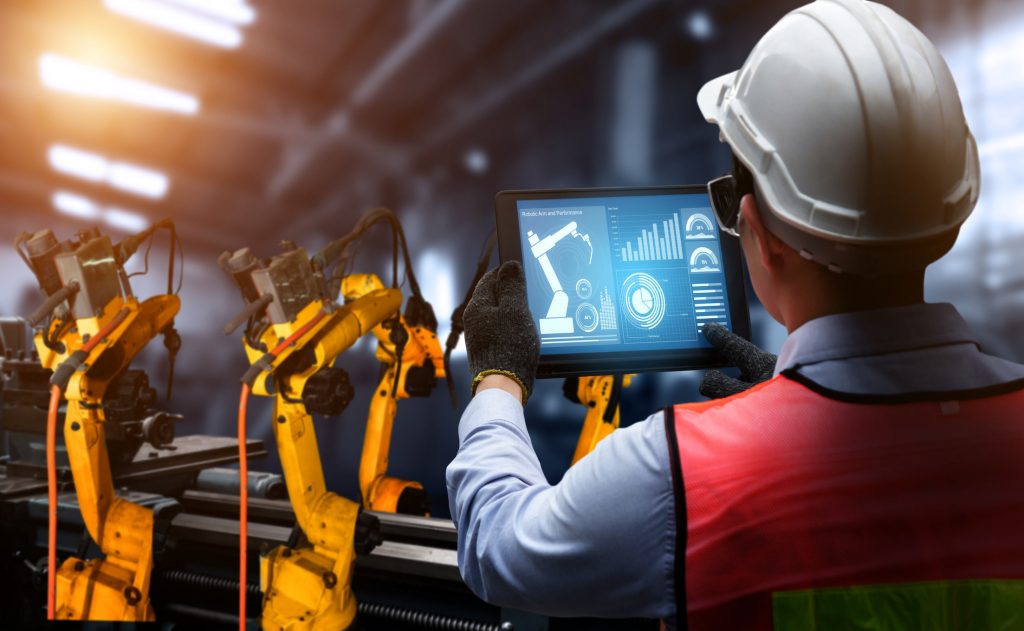
Industrial robotics
By Anastasiia Nestrogaeva (Junior Advisor on the Worldwide Initiatives Staff, Civitta)
Robotics4EU is a 3-years-long EU-funded undertaking which advocates for a wider adoption for AI-based robots in 4 sectors: healthcare, inspection and upkeep of infrastructure, agri-food, and agile manufacturing. Thus, Robotics4EU raises consciousness about non-technological elements in robotics by delivering a collection of workshops to contain the analysis neighborhood, {industry} representatives and residents.
The workshop “Robots: Mates and Enemies? Social influence of Robotics in Inspection and Upkeep” which happened on the twenty sixth of January, 2022 tackled the issue of interactions between robots and people. The best way to consider the actual influence of robotics on our society? The best way to resolve if robots are hazardous and will complicate human lives? To what extent does society settle for quickly progressing robotic applied sciences? All these points have been introduced up in the course of the fruitful dialogue on the workshop. Round 30 individuals attended the workshop, with 65% of them belonging to the analysis neighborhood and 10% to {industry} representatives. About 25% comprised most of the people. The individuals represented 23 totally different international locations, principally European ones.
The workshop initiated with the presentation of the undertaking and a brainwriting session at higher involvement of individuals into dialogue, then 4 audio system shared their experience with the individuals. The primary speaker was Roberto Zicari who’s an affiliated professor on the Arcada College of Utilized Sciences in Helsinki and an adjunct professor on the Seoul Nationwide College. Additionally, Roberto leads a workforce of worldwide consultants who outlined an evaluation course of for Reliable AI, referred to as Z-Inspection®. The speaker enlisted 4 important elementary rules which lie down within the EU Framework: respect for human autonomy, prevention of hurt, equity, and explicability. Additionally, there are 7 important necessities of the EU in direction of the reliable AI: accountability; societal and environmental well-being; range, non-discrimination and equity; transparency, privateness and information governance, technical robustness and security.
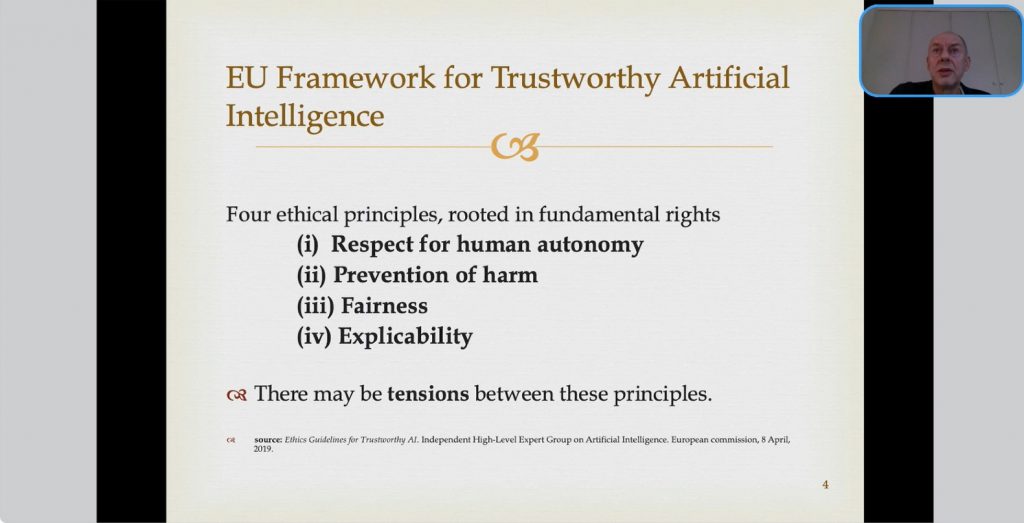
Regardless of the prevailing necessities, the EU Framework doesn’t keep in mind the evolving nature of the applied sciences and isn’t contextualised in line with varied area peculiarities. That’s the reason, as Roberto pressured, Z-inspection used a holistic strategy and created the orchestration course of which helps groups of consultants entry the moral, authorized, technical and area particular implications for using AI services or products. This course of may be employed throughout the entire AI lifecycle and makes use of socio-technical situations to determine points. Then, the workforce of consultants map to reliable AI (onto the moral classes established by the EU´s Pointers for Reliable AI), execute and resolve (give suggestions to stakeholders).
Second speech was delivered by Maarit Sandelin who works because the European Community Supervisor in SPRINT Robotics specializing in Robotic Innovation. Maarit defined that SPRINT Robotics is an industry-driven initiative that promotes the event, availability and utility of Inspection & Upkeep Robotics all over the world. There are 4 focuses which embrace security enchancment, price avoidance and discount, environmental efficiency enchancment, and basic efficiency enchancment. Maarit defined that SPRINT Robotics is an industry-driven initiative that promotes the event, availability and utility of Inspection & Upkeep Robotics all over the world. There are 4 focuses which embrace security enchancment, price avoidance and discount, environmental efficiency enchancment, and basic efficiency enchancment.
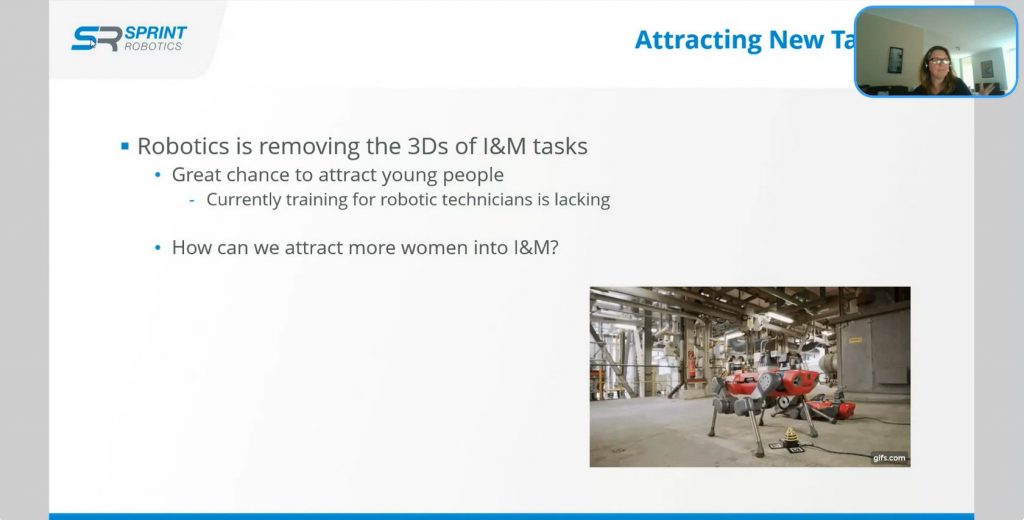
Maarit pressured that COVID-19 positively has been growing the curiosity of enterprise in robotic options. A complete of 88% of companies worldwide plan on adopting robotic automation into their infrastructure to extend effectivity and security. Additionally, there can be a 12% improve in cargo of robots worldwide and collaborative robots (cobots) will represent 34% of all robotic gross sales by 2025. The speaker observed that many harmful inspection and upkeep actions may be accomplished by robots and effectivity is reached primarily by the preparation stage. Nevertheless, the principle limitations for integrating the robotics resolution into operations are laws. In some international locations, the utilization of robotics shouldn’t be allowed by the legislature or its interpretations which, in flip, trigger points for service and technical suppliers. Maarit strongly believes that the coverage adjustments are wanted to contribute to the adoption of robots.
There are additionally different limitations of a wide-spread adoption. Firms would wish to scale back the workforce, to change the placement the place an organization operates, and even to change the entire worth chain. Additionally, the abilities gaps within the native labour markets can also be seen as a possible danger which might require correct coaching. Speaking about displacement of jobs, Maarit said that it’ll proceed and 85 million jobs can be displaced by 2025, however 97 jobs might seem as a consequence of new division of labor between people and machines. Maarit mentioned there’s a want to indicate staff that robotics shouldn’t be black-and-one, and reskilling might assist to save lots of a job.
The second half of the workshop featured the BugWright2 Challenge which does autonomous robotic inspection and upkeep on ship hulls and storage tanks. Alberto Ortiz Rodrigez, who works as a Professor at College of the Balearic Islands, gave the details about the targets and important actions of the undertaking. The undertaking has the 5-steps strategy: multi robotic process allocation; mission planning; autonomous inspection; information publish processing and actionable information technology; and upkeep which embrace hull cleansing, augmented actuality, defect marking. Alberto confirmed just a few examples of robots which carry out totally different duties. Lasly, the speaker pressured the significance of the undertaking, enlisting 4 potential impacts. First, it demonstrates how the automated multi-robot applied sciences may be deployed right into a large-scale industrial downside. Second, such applied sciences result in price effectivity: gasoline saving, decrease service prices, no immobilisation prices. Third, it brings a optimistic environmental influence, because it makes the ships and tanks safer, contributes to decrease gasoline consumption and smaller want for antifouling. Lastly, these autonomous inspections are regulated by the World Maritime Organisation (UN).
The final speech was delivered by Thomas Ellwart who works as a Professor on the College of Trier. He touched the subject of the interactions between robots and people. Whereas mentioning the principle matter of the workshop “Are robots associates or enemies?”, the speaker observed that there’s a must outline a standards of phrases “associates” and “enemies” or, in different phrases, standards of useful / dysfunctional human-robot-interactions (HRC). For psychologists, the principle necessary concern to judge among the many HRC is a really particular process of staff on the ship. Thomas is satisfied that there’s a must replicate summary fashions of robotic options from on-site consumer perspective. Speaking about standards of useful HRC, they need to:
 Nevertheless, a excessive robotic autonomy causes some dysfunctional results of excessive robotic autonomy equivalent to exclusion of people for security causes, lowered prospects to use and prepare abilities, tasks to react in case of failures or disturbances, and low high quality residual duties. This fashion, people are excluded from the duty efficiency, however they’re nonetheless accountable for system malfunctioning. This fashion, a excessive autonomy creates the excessive interdependence between human duties and robots – if a robotic breaks, a process is beneath hazard, which can postpone the accomplishment of those duties. Additionally, Thomas pressured that acceptance can also be a double-faced matter: overtrust is as harmful as distrust.
Nevertheless, a excessive robotic autonomy causes some dysfunctional results of excessive robotic autonomy equivalent to exclusion of people for security causes, lowered prospects to use and prepare abilities, tasks to react in case of failures or disturbances, and low high quality residual duties. This fashion, people are excluded from the duty efficiency, however they’re nonetheless accountable for system malfunctioning. This fashion, a excessive autonomy creates the excessive interdependence between human duties and robots – if a robotic breaks, a process is beneath hazard, which can postpone the accomplishment of those duties. Additionally, Thomas pressured that acceptance can also be a double-faced matter: overtrust is as harmful as distrust.
To replicate all the standards, the psychologists have a look at particular duties, asking what degree of autonomy the robotic has and what subtasks it performs. Is it making choices or simply monitoring and implementing motion? Thus, from the consumer perspective, there are important components which ought to be taken under consideration:
As one the goals of Robotics4EU is to develop the Accountable Robotics Evaluation Mannequin, a important coordinator of the undertaking, Anneli Roose, talked about social readiness of robots. Thus, to be able to decide this, it is very important work out to what extent a robotic meets a) moral values, b) socio-economic wants, c) information points, d) schooling and administration points, e) authorized considerations. It doesn’t cowl any authorized or regulatory necessities. The muse to construct the Robotics4EU Evaluation Mannequin is the Societal Readiness Ranges, whereas the used instruments are surveys, interviews, debates, workshops, and stakeholder boards involving the robotics analysis neighborhood, coverage makers, and residents.
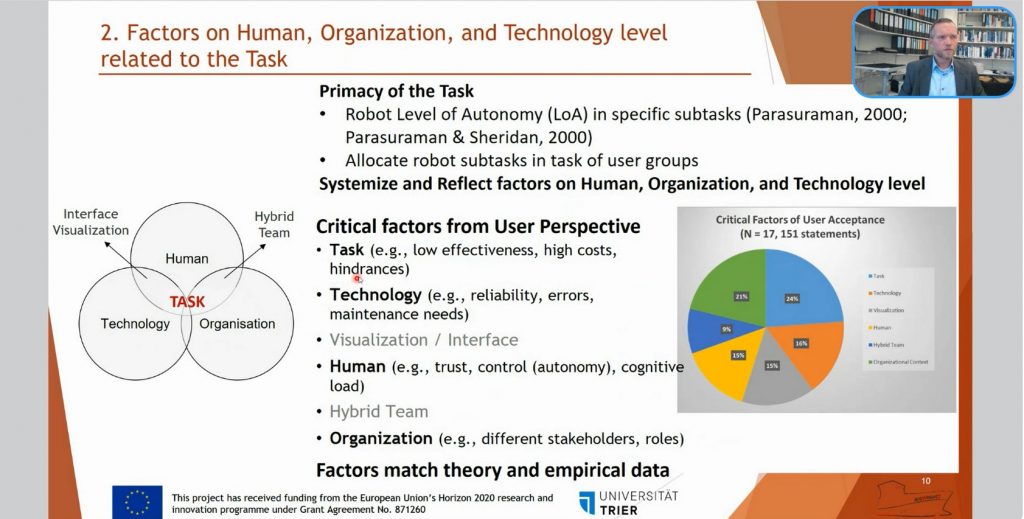
Lastly, the workshop completed with the panel dialogue which introduced up very controversial matters.
The best way to design a self-assessment mannequin or self-assessment instrument in a approach it could be legitimate in 2-3 years. Is it attainable and even related?
Thomas Ellwart pressured that it is a fairly tough query, because it requires to contain the customers and the market. One other matter is whether or not the automated system can be sustainable and adaptable to the altering atmosphere and dependable over the time which is definitely a query to the builders and engineers. Roberto Zicari notices that the Maturity Evaluation Mannequin ought to be area particular, as a robotic aiding the healthcare could be very totally different from the robotic changing mine staff. Thus, it’s fairly tough to switch data obtained within the healthcare sector to the Inspection and Upkeep. He pressured that it could be very attention-grabbing to create an interdisciplinary working group targeted on a number of domains and attempt to assess societal readiness degree.
Are the regulatory limitations vital? Are these limitations within the EU laws or/and nationwide laws?
Thomas Ellwart states that there are 2 tough issues: security and information safety, which come collectively if we’re speaking concerning the regulation on AI. Roberto Zicari talked about that the EU proposed the primary AI Regulation Act, aimed toward regulating any AI-based programs and options which relies on the danger evaluation strategy. This proposed act seems to be at AI primarily as a software program, reverse to the classical definition. Nevertheless, which precise composition of {hardware} and AI poses excessive danger and low danger? Thus, Roberto pressured that there’s a want for discussions amongst researchers, regulation neighborhood and {industry} consultants. Some individuals additionally observed that the regulatory framework would have to be tailored to the cultural variations all all over the world.
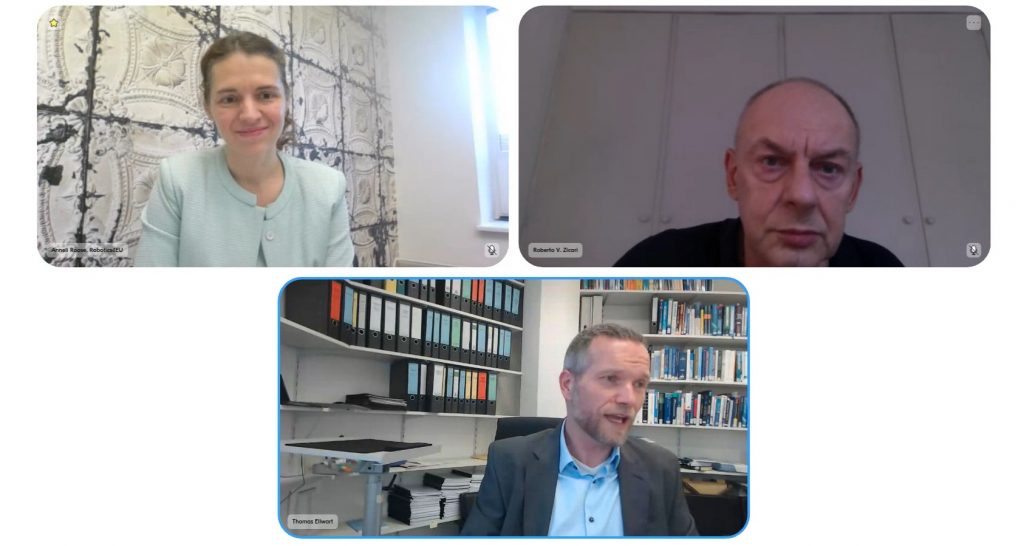
The upcoming workshop on the twenty third of February 2022, 11-14 CET “Boosting Improvements and Maximising Societal Affect. Function of Digital Innovation Hubs (DIHs) in Robotics for Inspection & Upkeep”. We are going to have a look at digital innovation hubs as a solution to join establishments and SMEs, serving to to shut the data hole of non-technological problems with robotics in Inspection & Upkeep. We are going to deal with alternatives which deliver SMEs and tech startups collectively and the way they will probably enhance their improvements within the revered space. The workshop will function representatives from digital innovation hubs, in addition to {industry} consultants.
tags: c-Industrial-Automation
Robotics4EU
is a 3-year-long undertaking funded beneath the European Union’s Horizon 2020 analysis and innovation programme.

Robotics4EU
is a 3-year-long undertaking funded beneath the European Union’s Horizon 2020 analysis and innovation programme.
[ad_2]